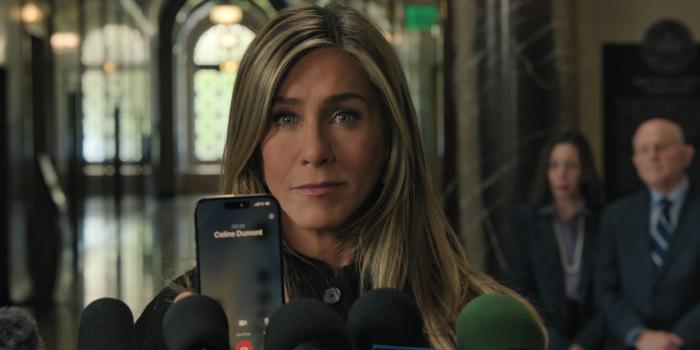By Dustin Rowles | TV | November 21, 2025

I have seen two television finales just this week that hinged on one of the oldest, most overused narrative shortcuts: the secretly recorded confession. Y’all, it needs to stop. Spoilers for The Beast In Me and The Morning Show, among others, below:
It happens in Netflix’s latest thriller, The Beast in Me, starring Claire Danes and Matthew Rhys. Rhys’ character — the villain — spends most of the season meticulously orchestrating a murder and framing Danes’ character for it. The plot is tight, almost maddeningly so. She’s arrested, charged, locked up — the frame job is ironclad. But all the writers have to do to undo their own perfect crime is rely on the villain’s arrogance. His wife conveniently becomes a plot device, secretly recording his full, unforced confession and playing it at a press conference for maximum impact.
It works, because it always works, and we get the obligatory shot of the bad guy being led away in cuffs.
A similar trick appears in the season four finale of The Morning Show. Celine Dumont, played by Marion Cotillard, spends the season masterminding an elaborate cover-up that includes having Bradley Jackson thrown into a Belarusian gulag. Once again, the scheme is airtight. The only way it falls apart is if Celine confesses — and she does, because her boyfriend (Billy Crudup) calls her, goads her into admitting everything, and she doesn’t realize she’s on speakerphone at, of course, a press conference.
Two different shows. One week apart. Same device: a trusted romantic partner elicits a confession, unknowingly recorded and unveiled in front of cameras.
They’re hardly the first offenders. Another Celine — this one played by Nicole Kidman in another Reese Witherspoon project (Big Little Lies) — uses a hidden iPad to capture her husband’s abuse and play it in court. Veronica Mars hides a tape recorder in her bag to nab Aaron Echols. Benoit Blanc uses a secretly recorded confession to take down Ransom in Knives Out. Mickey Haller nails a killer with a hidden recording in Matthew McConaughey’s Lincoln Lawyer.
It’s one of the most abused tropes in television and film. And while it’s almost always satisfying, it’s also one of the cheapest ways to write characters out of corners they’ve painted themselves into. The setup rarely varies: the confidant hits “record,” the narcissist talks too much, and the entire conspiracy collapses in seconds because apparently no villain has ever considered the possibility that an iPhone might be listening.
It’s too easy, which is why I genuinely appreciated the end of The Murdaugh Murders, which also aired this week. Alec Murdaugh wasn’t taken down by a conveniently hidden phone capturing a confession. He was taken down because his voice was recorded on an iPhone in a place he insisted he’d never been — a candid moment, captured by his victim’s device, not a dramatic sting. He didn’t confess. No one lured him into spilling the truth. Yet the effect was the same. And crucially, it’s how it actually happened. In the real world, if you’re about to confess to a felony, you’re at least going to wonder if someone has tapped “record.”
In fiction, though? Apparently not. And that’s exactly why the trope needs a long, overdue rest.